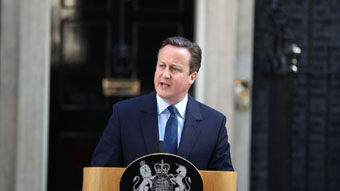
Image courtesy of C-Span
British Vote to Leave EU,
Cameron Resigns
| published June 24, 2016 |
By R. Alan Clanton, Thursday Review editor
The vote was supposed to be a close one, at least according to polls conducted as recently as two days ago. Instead, voters in the Britain have shocked the world by endorsing a move to separate the country from the European Union, and move which has already had widespread impact on the political and economic stability of scores of other nations.
Some financial markets fell on the news amidst fears that the resulting economic disruptions could spark recession in many parts of the world. Within hours, the value of the British pound fell sharply against the value of the U.S. dollar, and EU markets saw a slippage of as much as eight percent. The Bank of England intervened quickly to stave off a market panic in the U.K. But hours later, Wall Street reacted by dropping more than 600 points in a single day, an indication of the global uncertainty unleashed by the British decision to disconnect from the EU.
Central to the long term impact of the vote: the British will likely have to negotiate scores of separate trade agreements with its former EU partners, and it will also face a variety of unforeseen trade barriers when it becomes a non-member. But Britain may also sever its relationship to the mounting debt problems faced by other EU nations, especially Greece, Spain and Italy.
The vote also brought about the resignation British Prime Minister David Cameron, who said he will leave office no later than October. Cameron had strongly supported the campaign for the U.K. to remain a member nation of the EU. The vote was 52.1% in favor of British separation from the European Union.
“The British people have the made the very clear decision to take a different path,” Cameron said in a televised speech late Thursday, “and as such I think the country requires fresh leadership to take it in this direction.”
“I do not think it would be right of me to be the captain that steers our country to its next destination,” a clearly emotional Cameron added.
The vote was neither unanimous nor without contention. Though England voted to quit the EU, in Scotland a majority voted to remain. This sharp division may yet lead to another nationwide referendum in Scotland to break away from the U.K., as leaders in Scotland have already called for a new national vote in the wake of the EU decision. In 2014, Scotland narrowly voted to remain a member of the United Kingdom.
From a military and strategic standpoint, it is unclear what will emerge in a European Union without British membership, and U.S. military analysts are considering how NATO may be reshaped in the wake of the vote.
The process of exiting from the EU will be complex and multifaceted, and some experts say it could take several years to complete—especially the process of unraveling and untangling banking, trade and business relationships. Britain accounts for about one seventh of the economic output of the EU, and its business and banking elements are deeply interconnected in those of scores of European economies.
The British vote may also trigger similar calls for national referendums by anti-EU, rightist, leftists, and other populist forces in Portugal, the Netherlands and France, and it may reignite some of the near-catastrophic problems which recently imperiled the economy of Greece.
The political disruptions in Britain are enormous and without precedent for well over a generation. In the wake of Cameron's plan to resign, Boris Johnson and Michael Gove are already working on their contingency plans to take the helm of the Conservative Party. Johnson addressed all of Britain from the Vote Leave offices, and insisted that the outcome of the vote does not mean that Britain is turning its back on Europe, nor is England entering a phase of isolationism.
"To those who may be anxious at home or abroad," Johnson told supporters and opponents of the measure, "this does not mean that the UK will be any less united, nor indeed does it mean that it will be any less European." Johnson is seen as the likely successor to Cameron, though the political disruptions have also reveberated through Labour as well, triggering a possible challenge to Labour leader Jeremy Corbin.
Related Thursday Review articles:
Cameron's Conservative Party Sweeps UK Elections; Thursday Review staff; Thursday Review; May 8, 2015.
Breaking Up is Hard to Do: The Scottish Vote; Thursday Review staff; Thursday Review; September 19, 2014.
